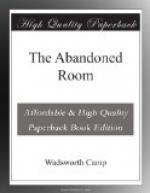Katherine shrank a little from the black entrance of the corridor, but her anxiety centred on the door ahead. She was about to call when a stirring beyond it momentarily reassured her.
The door opened and her uncle stepped out. He wore an untidy dressing-gown. His hair was disordered. His face appeared grayer and more haggard than it had downstairs. A lighted candle shook in his right hand.
“What are you doing up here, Katy?” he quavered.
She broke down before the picture of his increased fear. He shuffled closer.
“What you crying for, Katy?”
She controlled herself. She begged him for an answer to her doubts.
“You make me afraid.”
He laughed scornfully.
“You! What you got to be afraid of?”
“I’m afraid because you are,” she urged. “You’ve got to tell me. I’m all alone. I can’t stand it. What are you afraid of?”
He didn’t answer. He shuffled on toward the disused wing. Her hand tightened on the banister.
“Where are you going?” she whispered.
He turned at the entrance to the corridor.
“I am going to the old bedroom.”
“Why? Why?” she asked hysterically. “You can’t sleep there. The bed isn’t even made.”
He lowered his voice to a hoarse whisper:
“Don’t you mention I’ve gone there. If you want to know, I am afraid. I’m afraid to sleep in my own room any longer.”
She nodded.
“And you don’t think they’d look for you there. What is it? Tell me what it is. Why don’t you send for some one—a man?”
“Leave me alone,” he mumbled. “Nothing for you to be worried about, except Bobby.”
“Yes, there is,” she cried. “Yes, there is.”
He paid no attention to her fright. He entered the corridor. She heard him shuffling between its narrow walls. She saw his candle disappear in its gloomy reaches.
She ran to her own room and locked the door. She hurried to the window and leaned out, her body shaking, her teeth chattering as if from a sudden chill. The quiet, assured tread of disaster came nearer.
The two wings, stretching at right angles from the main building, formed a narrow court. Clouds harrying the moon failed quite to destroy its power, so that she could see, across the court, the facade of the old wing and the two windows of the large room through whose curtains a spectral glow was diffused. She heard one of the windows opened with a grating noise. The court was a sounding board. It carried to her even the shuffling of the old man’s feet as he must have approached the bed. The glow of his candle vanished. She heard a rustling as if he had stretched himself on the bed, a sound like a long-drawn sigh.
She tried to tell herself there was no danger—that these peculiar actions sprang from the old man’s fancy—but the house, her surroundings, her loneliness, contradicted her. To her over-acute senses the thought of Blackburn in that room, so often consecrated to the formula of death, suggested a special and unaccountable menace. Under such a strain the supernatural assumed vague and singular shapes.




